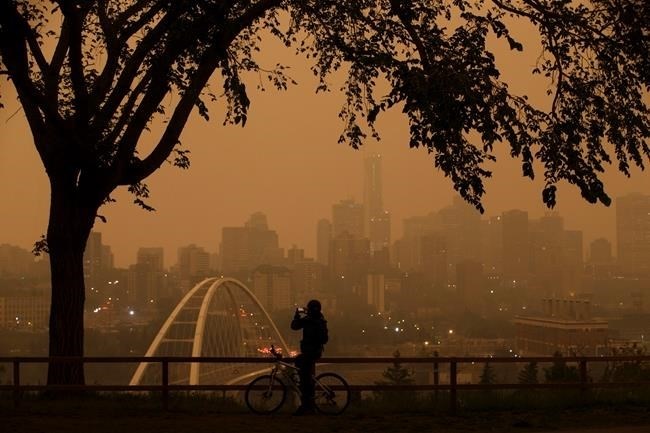
A morning commuter stops to take a photo of the city as smoke from the B.C. wildfires rolls in over Edmonton on Wednesday, August 15, 2018.
Image Credit: THE CANADIAN PRESS/Jason Franson
August 15, 2018 - 4:30 PM
EDMONTON - Air quality warnings were issued across the Prairies on Wednesday as smoke from forest fires in British Columbia continued to waft across most of Alberta and parts of Saskatchewan and southern Manitoba.
Environment Canada issued a special statement for much of the Prairies that said air quality was poor and conditions were not expected to change for the rest of the week.
The smoke was particularly dense in Alberta where visibility in the capital region Wednesday morning was limited as the sky turned a dark and dirty-brown colour from smoke and particulates. Street lights had not clicked off as of 8 a.m., drivers used their headlights on the way to work and an acrid smell hung heavy in the air.
"What Alberta is seeing right now is the effects of wildfires burning in central British Columbia," said Dr. Chris Sikora, medical officer of health for Alberta Health Services in the Edmonton area.
"That smoke is passing over the mountains and into Alberta and causing really adverse and poor air quality across much of the province."
The conditions prompted the CFL's Edmonton Eskimos to move their afternoon practice indoors.
Similar conditions prevailed in Calgary, where trying to make out the city's skyline from any distance proved difficult early in the day.
The air-quality index in both Edmonton and Calgary was at 10, which is considered high risk.
Dr. Jason Cabaj, medical officer of health in the Calgary region, said poor air quality can pose a risk particularly for children, seniors or people with pre-existing health conditions.
"When we get to the levels we're seeing today, we recommend that those vulnerable groups avoid any strenuous outdoor activities and try to shelter themselves as much as they can," he said.
Cabaj said the general population should also consider reducing or rescheduling any outdoor activities.
Both Alberta Health Services and Environment Canada said people can experience increased coughing, throat irritation, headaches or shortness of breath. Children, seniors and those with cardiovascular or lung disease are especially at risk.
Cabaj said emergency rooms have recorded increased visits when there is poor air quality.
"In 2015, when the wildfire situation did last for a week at the end of August, we saw around a 10 to 15 per cent increase in visits related to the kind of things people can be affected with in this kind of event," he said.
People were being urged to call Alberta's Health Link at 811 or contact their family doctor to determine whether they needed to seek professional help.
News from © The Canadian Press, 2018